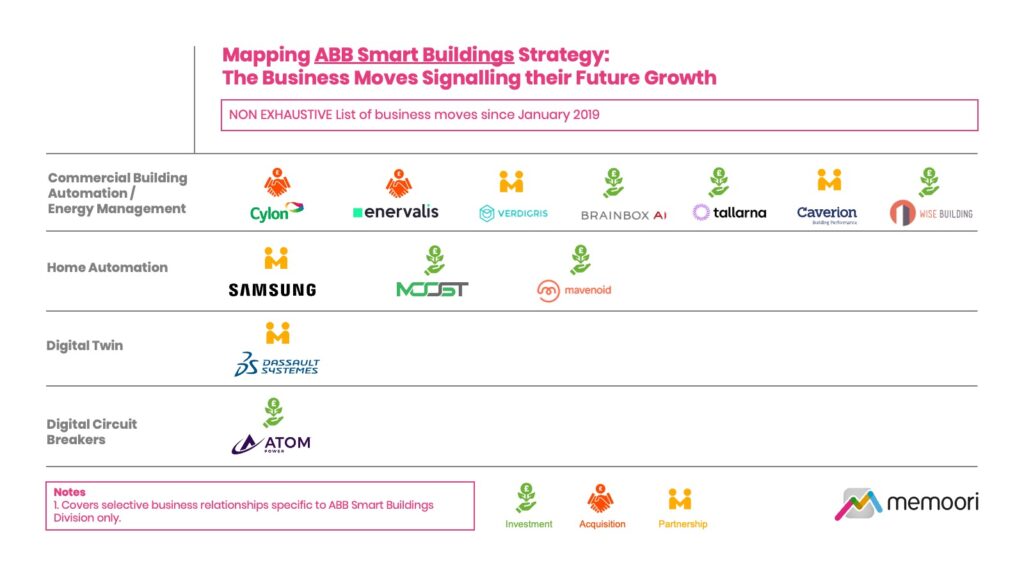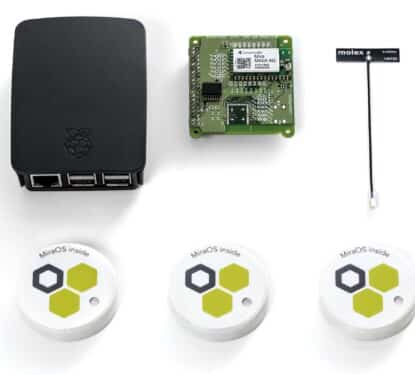This Research Note examines the emerging strategic priorities of ABB’s Smart Buildings division. We have mapped the acquisitions, strategic partnerships and investment activity of the business unit to ascertain their growth ambitions, by categorizing the various relationships and deals by technology and investment type over a 4-year period. This analysis is intended as a non-exhaustive indicator of ABB’s strategic direction in the smart buildings sector between January 2019 and September 2022.
The division, one of 6 business units of the $13.2 billion Electrification segment of ABB, reports revenues in the range of $2,750 to $3,250 million for 2021. Memoori previously examined the 2021 activities of the Smart Buildings business in a Research Note in February 2022.
The commentary below relates to investments, acquisitions and strategic partnerships in the last three years, across the commercial building automation and smart home businesses.

Commercial Building Automation, Energy Management
In March 2020, ABB announced the acquisition of Cylon Controls, a second-tier Irish building automation and energy management systems manufacturer. We remarked at the time that ABB’s strategy to ramp up its mid-market commercial building control systems business would also add a global network of systems integrators.
In April 2021, ABB completed the acquisition of a majority stake in Enervalis, a Belgian provider of energy management software with $1 million in revenues and 22 employees, having led a 2.8 million Euro funding round in January 2021. Founded in 2013, Enervalis has developed a platform based on artificial intelligence (AI) and machine learning (ML) for the smart control of energy assets such as HVAC installations, heat pumps, boilers, and batteries. The Smart Buildings component of the Enervalis Smartpower Suite addresses residential homes, multi-occupancy buildings, and commercial real estate. The platform claims to improve energy efficiency significantly, compared to traditional Building Management solutions.
In October 2021, ABB Technology Ventures was the lead investor in the $24 million Series A funding round of Canadian start-up company BrainBox AI which has developed predictive and self-adaptive artificial intelligence to optimize buildings’ energy usage, carbon footprint, and operational efficiency. The strategic partnership allows ABB’s Smart Buildings division to combine its existing portfolio of digital solutions, particularly the ABB Ability Building Ecosystem, with BrainBox AI’s autonomous AI technology. A key part of the relationship between BrainBox AI and ABB included a global distribution agreement, announced in January 2022, to bring the AI-driven solution to ABB’s existing customer base.
In September 2022, Caverion and ABB announced a partnership to accelerate the development of energy-efficient and sustainable buildings in Europe through integrated, smart solutions. Bringing together ABB’s technology solutions and Caverion’s sustainable solutions and system integration capabilities will expand the offering of both companies in Finland, the Baltic countries, Sweden, Norway, Denmark, Germany and Austria. The complementary offering can be utilised in new buildings and retrofits to enable more automated, intelligent and sustainable buildings in line with evolving customer demands.
Tallarna, a UK startup, co-created an ‘as-a-service’ matching solution with ABB for their ABB Ability Energy Manager suite, announced in June 2022. The solution helps businesses to match their energy use with consumption and benchmark against other buildings to make informed decisions to achieve net-zero targets. Formerly known as Pivot Energy Services the company develops ML technology that analyses energy use of buildings in order to recommend where savings could be made. Tallarna is using an innovative agent-based approach to energy modelling and their Kestrel decision-support solution to create financially viable retrofits. The result is a business case for building retrofits, with improved accuracy and greater confidence in project success.
French startup, Wise Building, won the 2021 ABB Electrification Startup Challenge in the Smart Buildings category with its building management platform. Wise Building's "all-in-one" human-centric application gives users in commercial buildings a flexible tool for booking meeting rooms or shared desks, ordering lunch or adjusting heating, lighting and cooling in their office. The application can closely interact with ABB's open building operating system, making building operation easy to use, more efficient and sustainable.
Home Automation
In April 2022, ABB and Samsung Electronics announced a global partnership to provide jointly developed technologies for energy savings, energy management, and the smart Internet of Things (IoT) connection of both residential and commercial buildings. The collaboration will enable Samsung and ABB to expand customer access to home automation technologies and better device management while facilitating electricity load shifting. By connecting the Samsung SmartThings application and ABB home automation solutions for example, residents will be able to use their personal devices to monitor and manage a full spectrum of white goods, as well as gas and smoke sensors, energy, security, and comfort systems from a single application.
In parallel to the home automation solutions, the two companies intend to expand collaboration between the Samsung Electronics heating, ventilation, and air-conditioning (HVAC) products and variable refrigerant flow (VRF) room control system and the ABB HVAC control system for commercial buildings and multi-dwelling developments.
MOOST, a Swiss startup, was one of the winners of the 2022 ABB Electrification Startup Challenge and will work closely with the ABB Electrification Smart Building’s team to bring its SaaS Smart Home Recommender platform to the market. Their product is a user engagement platform that helps building technology companies yield more revenues through better user engagement. Based on real-time analysis of data from household’s connected devices (heating, cars, blinds, etc.), users receive proactive notifications that help them increase energy efficiency.
In August 2022, ABB announced an investment in a Stockholm-based startup, Mavenoid. The hardware support platform uses AI and ML to solve customer enquiries with high success rates. Already in use in selected markets with smart home solutions such as ABB-free@home, the self-service and live support platform spans automation, workflow, escalation, and product intelligence feedback. Over the coming months, the partnership will expand from end users in homes into ABB’s installer network to cover commercial buildings.
ABB Smart Buildings division is expanding its product and systems portfolio for commercial buildings and residential applications through innovation with digital building management systems and bolt-on acquisitions augmented by strategic partnerships with innovative startups and established vendors and service providers.
This article was written by Daphne Tomlinson, Senior Research Associate at Memoori.



